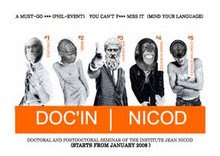vendredi 5 juin 2009
Semantic Relativism and Two Notions of Subjective Perspective
Marie Guillot (PhD with François Récanati)
Le nom de "Dieu" est-il propre?
Yann Schmitt (PhD Student with Frédéric Nef)
Abstract: Si "Dieu" est un nom propre et si l'on accepte une théorie de la référence directe, il semble que la phrase, si longtemps débattue, (P) "Dieu existe" ressemble à une tautologie. Si "Dieu" réfère directement à une entité alors il est trivial de dire que Dieu existe. La question des noms propres éventuellement vides se pose donc pour quiconque doit analyser (P). Je me propose de voir comment les théories descriptivistes et de la référence directe peuvent permettre de donner une lecture acceptable de (P) dans le cadre d'une discussion sur sa valeur de vérité.
lundi 6 avril 2009
lundi 23 février 2009
"Paths to Singularity: Cognitive Space and the Construction of Singular Thought"
lundi 16 février 2009
Descriptive Names as Descriptions of Names
Friday 27th February 2009 (14:30-16:30 pm)
Gregory Bochner (PhD with François Recanati and P. Kreutz)
vendredi 19 décembre 2008
Is there such a thing as a constitutive rule?
Friday 20th February 2009 (10:00-12h00 am)
Olivier Morin (PhD with Dan Sperber)
Abstract: In the philosophy of social sciences, one frequently encounters the claim that every institution is founded upon at least one constitutive rule. Constitutive rules, as opposed to rules that merely regulate already existing behaviours, are supposed to make possible social practices that would not exist independently of the rules thaey are constituted by. Thus, it is said, one cannot, on pain of contradiction, lend money to one's self, because one constitutive rule of the institution of lending is that there must be a borrower distinct from the lender. Two claims will be defended. First, in order to be constitutive in an interesting way, a rule must be part of a complete definition of the institution it constitutes. Otherwise, an instance of the institution could exist without instantiating the rule. Second, institutions are very hard to define in a complete way. To say that a rule is constitutive is merely to make a risky bet on the future of that institution and the stability of public consensus.
